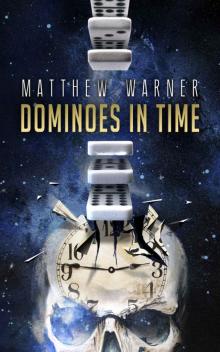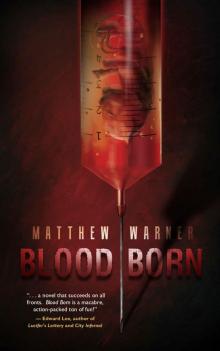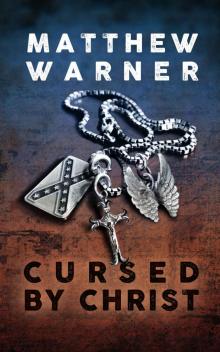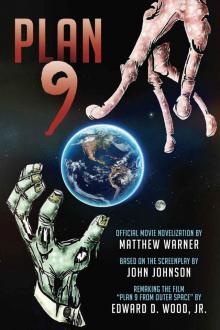- Home
- Matthew Warner
The Organ Donor: 15th Anniversary Edition
The Organ Donor: 15th Anniversary Edition Read online
THE ORGAN DONOR
15th Anniversary Edition
with a new afterword by the author
Matthew Warner
Praise for the works of
Matthew Warner
The Organ Donor
“I couldn’t believe how good it was… Matt Warner took the used-up idea and sowed a story full of old myths born anew… Warner has written a classic of modern horror literature. I’ve read it 3 times now.”
—Feo Amante
“The Organ Donor is a promising debut. Warner is a writer with a strong social conscience. He engages his reader’s emotions and intellect equally, creating a suspenseful supernatural thriller with a serious thematic core.”
—Hellnotes
Death Sentences:
Tales of Punishment & Revenge
“His writing is taut and to the point, weaving the deeply disturbing with the wholly personal aspect of each of his characters into a remarkable assemblage of fear and dread.”
—Dark Discoveries
“This brief but darkly compelling collection hits all the right notes and hits them hard.”
—Rue Morgue Magazine
Eyes Everywhere
“Compelling and insightful.”
—Publishers Weekly
“Warner’s success in portraying the medically realistic unraveling of his protagonist is matched only by the amazingly consistent voice he employs to narrate… It’s a bravura performance, a monologue on madness, and it will stick with you during long, lonely nights.”
—ChiZine
Horror Isn’t a 4-Letter Word:
Essays on Writing & Appreciating the Genre
“These pieces subtly challenge the mainstream miscon-ception that horror is dangerous, meritless junk food.”
— Rue Morgue
“There are few published books that provide this kind of content and approach in the horror genre, so this book is a welcome addition… Highly recommended for large public libraries.”
— Monster Librarian
Blood Born
“Warner amalgamates multi-genre components with a broad landscape of cool characters to unleash a novel that succeeds on all fronts.”
—Edward Lee, author of Lucifer’s Lottery
“Warner’s understanding of how to use gore and violence as metaphor serves the story brilliantly. I can’t imagine any horror reader—even the most jaded—not loving this novel.”
—Gary A. Braunbeck, author of A Cracked and Broken Path
No Outlet
“As with Warner’s prior releases, the author’s strength in pacing, plotting, and characterization makes No Outlet one of those novels you just can’t put down.”
—Horror World
The Seventh Equinox
“The Seventh Equinox has it all: great characterization, exciting action, and an ending that will have you sitting up straight and wide eyed.”
—Horror World
Dominoes in Time
“Dominoes in Time is a fantastic collection, and proves that the author should be front and center in dark fiction.”
—The Horror Review
“Warner’s imagination is vast, and these stories leap off the page, staying with the reader in mind and heart. A highly recommended group of tales by a virtuoso writer.”
—Lisa Mannetti, author of The Box Jumper
Also by Matthew Warner
Novels
Plan 9: Official Movie Novelization
The Seventh Equinox
Blood Born
Eyes Everywhere
Novellas
No Outlet
Die Not in Vain
Collections
Dominoes in Time
Death Sentences: Tales of Punishment & Revenge
Non-fiction
Horror Isn’t a 4-Letter Word: Essays on Writing & Appreciating the Genre
Screenplays
Dr. Ella Mental’s Mad Lab Picture Show
(with John Johnson)
The Good Parts
The Lovecraft Chronicles (with John Johnson)
Criswell Predicts! (with Mr. Lobo)
Stage & Radio Plays
Chess is Blind
Pirate Appreciation Day
How the Martians Stole Christmas
Copyright © 2002 by Matthew Warner
Bloodshot Books Edition © 2017
All Rights Reserved.
No part of this book may be reproduced, distributed or transmitted in any form or by any means without the author’s written consent, except for the purposes of review
Cover Design © 2017 by Deena Warner Design LLC
http://deenawarnerdesign.com/
ISBN-13: 978-1-947522-03-9
ISBN-10: 1947522035
This book is a work of fiction. Names, characters, places and incidents are either a product of the author’s fertile imagination or are used fictitiously. Any resemblance to actual events, places or persons, living or dead, is entirely coincidental.
READ UNTIL YOU BLEED!
Acknowledgements
Deep thanks to my publisher, Pete Kahle, for writing to me out of the blue and asking to republish this novel. It’s a good thing you’re doing, bringing books back from the dead. Keep up the magic.
Also thanks to my wife, Deena Warner, for being my steadfast supporter. I tried to interest you in The Organ Donor the night we met. It has a better cover now.
Most importantly, my thanks to you, dear reader. Without your support, none of this would be possible.
Chapter 1
Despite its size and sophistication, the Chinese city of Jianshi smelled like pig dung when the wind was right. Borne on morning breezes from the Bo Sea, the odor rose from suburban pork farms, swept over the Yellow River and permeated the commercial district like a fog.
With it came the morning rush hour of bicycles, trucks and beasts of burden converging on Heping Bazaar, the open-air market where one could buy anything from breakfast to a haircut. European tourists emerging from the Hyatt Regency wrinkled their noses before heading for the Bazaar and the huge Laughing Buddha statue on Xiying Road. Usually they didn’t walk; a line of pedicabs waited out front, the drivers wearing English Beijing Olympics ’08 buttons. On this particular April day, the destination most requested in pidgin Mandarin was the Kite Festival at Changfeng Park.
Along the way, the tourists passed the Jianshi Paramilitary Police General Brigade Hospital, which was pleased to treat wealthy foreigners for a surcharge, all services paid up front. The care was excellent, the food passable, and kidney transplants surprisingly easy to acquire. This made it a favorite destination for those tired of waiting lists and uncaring of where the spare organs came from.
Behind the hospital, Doctor Li Jun of the Department of Burn and Plastic Surgery knelt in the parking lot and used a screwdriver to remove the license plates from two ambulances and two white sedans. He was dressed in civilian clothes. It was his hundredth time doing this, and for the hundredth time he wished he were anyplace else.
Smoking cigarettes and saying little, his colleagues, also dressed plainly, loaded coolers and boxes of surgical equipment into the trunks of the sedans. One of them paused to strip the vehicles’ magnetic hospital logos.
Gate guards saluted the convoy as it departed the hospital and turned right onto Xiying Road. The tide of bicycles, pedestrians and honking cars flowed around them like molasses. Silent and forlorn, Jun thought the Laughing Buddha’s smile faded as it dropped behind them. Old men in Changfeng Park looked up from their chessboards to stare. A line of women faltered in their practice of taijiquan’s slow, graceful movements.
Did they all sense what errand he was on?
The traffic didn’t thin until they left the commercial district and passed a gray brick wall emblazoned with six-foot white letters reading, CRACK DOWN HARSHLY ON THE VIOLENT CRIMES OF BOMBING, ARSON AND MURDER. Below it, someone had risked his life to spray paint a Falun Gong slogan: GREAT LAW OF THE DHARMA WHEEL TURNS FOREVER.
Jun wasn’t surprised to see the graffiti. The state-sponsored sign was a leftover from the government’s previous “strike hard” campaign when the focus had been on prosecuting the listed crimes—a task the government did with characteristic efficiency, executing eight hundred people per month. China had an ancient expression, “Killing a chicken to scare the monkeys,” meaning that sometimes people must be singled out and punished as examples. And since monkeys were considered especially mischievous — a lone monkey, in fact, had once threatened the entire Chinese mythological pantheon — they required frequent warnings. But the current push was against the Falun Gong, a morality-based meditation and exercise practice that, even at its most questionable, Jun felt, did not deserve execution. The same could be said for some other capital offenses such as bribery and tax fraud.
He sighed as he remembered that most of the people he would help mutilate today were Falun Gong teachers.
The convoy traveled narrow roads between tightly packed apartment buildings that became narrow roads between tightly packed crop fields. Such was the demand for arable land that the fields didn’t stop at the Luliang Shan foothills farther west; the farmers merely terraced their tracts of vegetables.
A farmer’s small house with a smaller courtyard ringed by a bamboo fence stood at the intersection of two asphalt roads. Here, Jun’s sedan turned toward Xinkai Prison and its death row prisoners. The ambulances and other sedan co
ntinued for the execution grounds and crematorium to wait.
Jun’s duty was to prep the prisoners for execution. Escorted by a uniformed guard, he walked rapidly down a cramped cellblock with his clipboard and case of hypodermic needles. The guard carried a chair and placed it under him whenever he needed to sit. Instead of bars, each cell had a steel door fitted with a peep slot that the guard slid open to check the prisoner’s location before entering.
Always, the prisoner was seated upon the cushionless metal shelf that constituted his bunk, with his hands cuffed behind him and his ankle irons locked into a ring in the floor. Always, Jun retrieved the prisoner’s identification papers from the man’s front pants pocket and matched them to the blue list on his clipboard. Always, the papers listed the prisoner’s name, age, profession, work unit, address, and crime. And always, the papers never contained the signed consent form for organ donation. Officially, however, the form was supposed to be there, containing signatures from the prisoner and his family. But in reality, the families never even learned of the execution until after the fact, when they received a jar of ashes and an invoice for the bullets used.
Verifying identity at this point was critical—not to the executioners but to the doctors. The blue list was an inventory of the types and numbers of body parts to be harvested from each convict. It needed to be filled precisely because each prisoner had already been tissue-matched with patients at multiple hospitals. Jun had helped draw up this particular list himself on the day Section Chief Liu of the Jianshi Higher People’s Court notified him of the upcoming executions.
For the last ten years, Liu had opened negotiations by alluding to the hongbao, or red envelopes, of money given to children at New Year’s. “How many red envelopes might the hospital pay for a half-dozen corpses?”
Usually it paid two to five hundred yuan per cadaver—up to sixty U.S. dollars—depending on the number of prisoners and patients. Sometimes Liu would call later in the day to hint that in exchange for more money, the Court might make more bodies available by speeding up the adjudication of death sentence appeals.
After an interim price was agreed, someone would extract tissue samples from the prisoners and compare their human leukocyte antigen fingerprints to patients throughout the fraternal hospital network. Good HLA matches were rare except between relatives, so the goal was to match as many HLA types as possible and then to have immunosuppressive drugs such as cyclosporin-A do the rest. If all went well, the recipient’s body would not reject the foreign tissue.
The number of corpses would then be adjusted—usually downward—and Jun would deliver the red envelopes to Liu’s office. No receipts or evidence of the transaction were ever exchanged. Liu, however, was fond of concluding the deal by saying a Cantonese New Year’s expression, “Gon hay fat choi.” Wishing you prosperity.
No matter how many times he heard it, at that moment Jun always felt a chill. It brought the entire operation into focus—what they were doing and why. It was never just about giving a burn victim or dialysis patient a second chance at life. The crack of a handgun firing at point blank range at a prisoner’s head was really the clack of a cash register, starting with the pittance hospitals paid to Section Chief Liu and ending with the fortunes that patients paid to the hospitals.
A month ago, Jun had reached his breaking point and sent a letter to hospital director Xing requesting reassignment. A week passed without reply, so Jun left a message with Xing’s secretary. Another week passed. Jun called again. This time Xing answered.
“Of course I read it. The answer is no.”
“But why?”
“No other job matches your skills.”
Jun’s face had grown warm against the phone. “I respectfully remind the director that I have advanced degrees in surgery and human tissue studies, and have experience in a wide—”
“You stated that in your letter. The answer is still no.”
“But—”
“I’m not blind, Jun, I know why you’re doing this. And it’s not a good enough reason to transfer you to where you’ll be less effective.”
At that moment, Jun had imagined that if diulian, losing face, were a physical thing, the nurses passing his desk would see the flesh falling off his skull. But how had Xing learned of his misgivings? He’d revealed them to no one.
“You know my reason?” Jun said.
“Of course. You forget I’m a psychiatrist. But I’m also the director, and I won’t give you room to wallow in grief about how your wife left you.”
Afterward, Jun had rocked his forehead back and forth on his desk—roll to the left and he was thankful Xing hadn’t divined his true reasons for requesting a job change; roll to the right and he despaired that he’d been refused.
The futility of his life now weighed upon Jun’s shoulders as he entered the sixth prison cell of the morning. The invisible clamp of a migraine squeezed his head where his glasses touched his temples. He stopped short when he saw the convict seated upon the bunk.
Stared.
Always, the prisoners waited with their heads bowed and faces expressionless. This one sat up straight, and he was smiling.
More startling were his hair and eyes. Although he had the firm facial features of a Han Chinese man in his mid-thirties, this one’s hair was completely white. So was his beard, which he somehow kept neat and closely cropped in the comfortless environment. Razors were forbidden; where had he hidden it? As the guard placed the chair under him, Jun glanced about but saw nothing except the metal cot and the sanitary hole in the floor.
Again, he stared at the man’s eyes—blue, like a Caucasian’s. This was unheard of in the dark-eyed Chinese unless they wore colored contact lenses, but Jun was sure those weren’t permitted here. This was a rare mutation that now they would never have the opportunity to study. Jun glanced at the list and saw that the corneas were due to be harvested. The freak iris pigment, of course, would have no bearing on corneal quality.
Stop it. Don’t think like a butcher.
Jun retrieved the convict’s papers and confirmed the name, Shen Mutian, before removing his glasses to massage the bridge of his nose.
“Shen,” the man said. “You may call me Mister Shen.”
Jun looked up, startled by the baritone voice, but didn’t reply. He noticed that Shen also had a prominent Adam’s apple. Putting his glasses back on, he wrote, “Donor may have suffered”—past tense—“from hypothyroidism.”
The guard yanked up Shen’s left sleeve, exposing a tattoo of a blue dragon. “The doctor’s going to give you a shot. It’s a tranquilizer to prevent unnecessary suffering during the execution.”
Usually prisoners responded with a nod or by giving thanks to the government, but Shen said nothing. He only smirked as Jun uncapped a hypodermic.
With difficulty, Jun kept his eyes on the prisoner’s arm to hunt for a good vein below the tattoo. He had stopped bothering with alcohol swabs years ago; it was Doctor Xing’s pompous nephew who’d observed that any infection wouldn’t have time to fester.
The shot, of course, was not a tranquilizer but a dose of the anticoagulant heparin, which would ease organ extraction.
Shen had a muscular arm, so it was easy to find a vein. But this was also bothersome. Unlike in America, Chinese prisons weren’t full of exercise yards and barbells. Recreation for the most well-behaved prisoners consisted of mowing a drill field with scissors. Perhaps Shen hadn’t been here long enough to waste away. Depending on the circumstances, the time between a criminal’s arrest and execution could be as short as a month. Or perhaps Liu had passed on the hospital’s complaints about the need for well-fed, healthy bodies.
Unsettled, Jun hurried to finish up. He wrote on Shen’s arm where the executioner should aim. For nearly everyone else he wrote “head,” but since Shen’s corneas would be harvested, he wrote “heart.” In this case, though, it was still a tough call since Shen was one of the two prisoners also slated for kidney extraction; he just hoped the shooter didn’t aim too low.

 Dominoes in Time
Dominoes in Time Blood Born
Blood Born Cursed by Christ
Cursed by Christ Plan 9- Official Movie Novelization
Plan 9- Official Movie Novelization